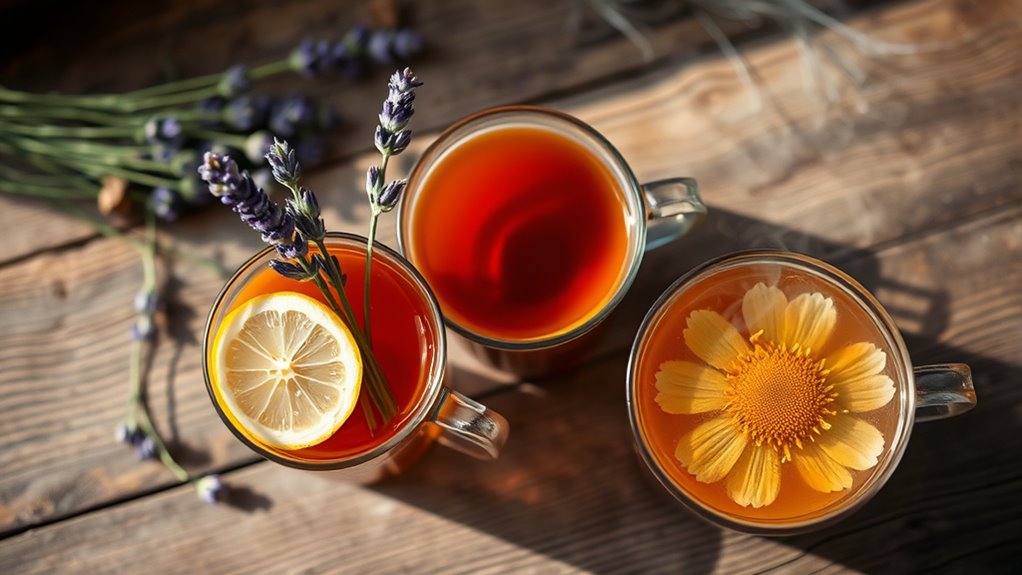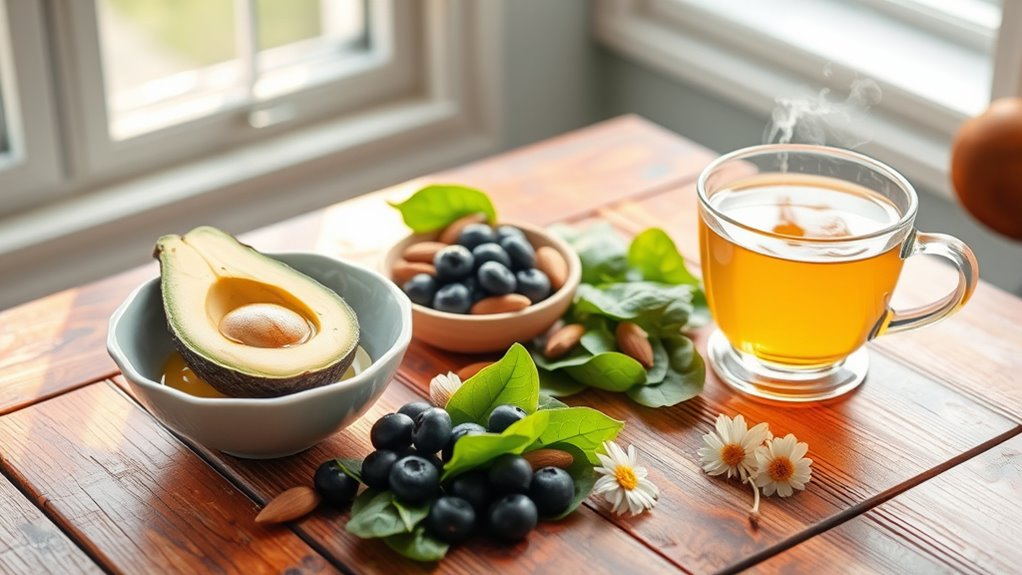To combat stress naturally, include omega-3-rich foods like salmon, walnuts, and chia seeds, which support brain health and reduce inflammation. Fill your plate with leafy greens such as spinach and kale to boost mood and antioxidant levels. Incorporate fermented foods like yogurt and sauerkraut to improve gut health, which influences your mental well-being. Sip calming herbal teas like lavender or green tea to promote relaxation. Keep exploring how these foods can help you stay calmer and more balanced.
Key Takeaways
- Consume omega-3-rich foods like fatty fish, nuts, and seeds to reduce inflammation and support brain health.
- Incorporate leafy greens such as kale and spinach, high in antioxidants, to combat oxidative stress linked to anxiety.
- Eat fermented foods like yogurt and sauerkraut to promote gut health and regulate mood through gut-brain axis support.
- Drink calming herbal teas such as lavender, peppermint, or green tea to enhance relaxation and lower cortisol levels.
- Choose whole grains and tubers like oatmeal and quinoa for steady energy and serotonin production, aiding stress resilience.
Incorporating Omega-3 Rich Foods for Stress Relief

Incorporating omega-3 rich foods into your diet is a natural way to help combat stress. These nutrients, especially EPA and DHA, can lower cortisol levels, a key hormone linked to stress. When you include fatty fish like salmon, sardines, or mackerel, you boost your intake of these beneficial fats. Shellfish such as oysters and mussels are also excellent sources. If you’re vegetarian or prefer plant-based options, flaxseeds, chia seeds, and walnuts provide ALA, which your body converts into EPA and DHA. Regularly adding these foods to your meals supports inflammation reduction, neurotransmitter regulation, and cellular protection—all of which contribute to better stress resilience. Planning your diet to include a variety of omega-3 sources can help you manage stress more effectively naturally. Additionally, understanding the importance of work-life balance can further enhance your overall stress management strategies. Incorporating self-care routines, such as mindfulness and adequate sleep, alongside dietary habits, can amplify your stress relief efforts. Maintaining a balanced lifestyle also involves proper nutrition, which plays a crucial role in supporting mental health and resilience against stressors. For example, including nutrient-dense foods like chia seeds and flaxseeds can further bolster your body’s ability to handle stress effectively.
The Power of Leafy Greens and Vegetables in Managing Anxiety

Dark leafy greens like kale and spinach play a vital role in managing anxiety, thanks to their rich antioxidant content. These nutrients help reduce oxidative stress, a key factor in anxiety. Plus, they contain chlorophyll, which boosts your body’s tolerance to stress. Their high levels of vitamins K, C, and E, along with minerals like folate and lutein, support brain health and cognitive function, lowering anxiety triggers. Including these greens can protect your brain and improve emotional well-being. Additionally, nutrients found in leafy greens may help regulate neurotransmitter activity associated with mood stabilization. Recognizing the importance of nutrients in mental health can further motivate incorporating these greens into your diet. For example, oxidative stress is linked to increased anxiety symptoms, and antioxidants in greens can counteract this effect. Consuming a variety of these greens regularly can also promote overall mental wellness, helping to sustain a balanced mood. Research indicates that maintaining a diet rich in antioxidants can support mental health and reduce the severity of anxiety symptoms. Here’s a quick look:
| Green Leafy Vegetables | Key Nutrients | Benefits |
|---|---|---|
| Kale | Antioxidants, chlorophyll | Reduce oxidative stress |
| Spinach | Folate, antioxidants | Support mental health |
| Collard Greens | Vitamins K, folate | Enhance cognitive function |
Incorporate these greens regularly to help manage anxiety naturally.
Fermented Foods: Supporting Gut and Mental Health Naturally

Building on the idea that what you eat influences your mood, fermented foods stand out for their ability to support both gut and mental health. These foods are rich in probiotics that introduce beneficial bacteria to your gut, promoting a balanced microbiome essential for emotional well-being. They strengthen your gut barrier, preventing toxins from entering your bloodstream and reducing leaky gut syndrome. A healthy microbiome helps modulate immune responses, lowering inflammation linked to stress and mood disorders. Fermented foods also stimulate the production of neurotransmitter precursors, supporting brain function and mood regulation. Regular intake improves gut health and microbiota diversity, which are vital for cognitive clarity and emotional resilience. Studies show fermented foods can reduce anxiety and depression symptoms, helping you manage stress naturally. Additionally, incorporating fermented foods may enhance digestive health by improving nutrient absorption and reducing gastrointestinal discomfort. Furthermore, a diverse microbiota can influence the production of neurotransmitters, impacting overall mental health and stress management. Recent research indicates that fermented foods can also positively affect mood by supporting the gut-brain axis. Consuming fermented foods can also foster microbiota diversity, which is crucial for overall well-being. Moreover, understanding the link between microbiome health and mental health highlights the importance of dietary choices in managing stress naturally.
Whole Grains and Tubers as Stress Stabilizers

Whole grains and tubers serve as natural stabilizers for your stress levels by providing steady energy and supporting mood regulation. They stimulate serotonin production, which calms your body, and their high fiber content helps keep blood sugar levels stable, reducing anxiety. Whole grains release energy gradually, preventing spikes and crashes that can trigger stress. Chewing whole grain foods can also help release tension through physical activity. Nutrient-rich and antioxidant-packed, they promote overall health and gut wellness, which is linked to better mental health. Incorporating foods like oatmeal, whole-grain bread, quinoa, and brown rice into your diet ensures sustained energy and mood stability. Regular consumption keeps your blood sugar steady, making it easier to manage stress throughout the day. The nutrient content of these foods plays a crucial role in supporting optimal brain function and emotional well-being. The digestive process can influence how these foods impact your body, supporting better digestion and nutrient absorption to further aid in stress reduction. Additionally, maintaining a balanced intake of these foods may support spiritual well-being by fostering emotional resilience and mental clarity. Consuming a variety of these nutrient-dense options can also enhance brain function, helping you stay focused and calm during challenging situations.
Calming Herbal Teas and Drinks to Reduce Stress

Herbal teas and calming drinks offer a natural way to reduce stress and promote relaxation. They contain compounds like theanine, polyphenols, and aroma that help lower cortisol, ease anxiety, and boost mood. For example, lavender tea has been shown to reduce depression and anxiety scores, while rose tea improves well-being over time. Green tea’s theanine promotes relaxation, and black tea lowers post-stress cortisol levels. Darjeeling tea enhances mood before mental tasks. Here’s a quick look at popular options:
| Tea Type | Key Benefit | Active Compound |
|---|---|---|
| Lavender | Reduces anxiety and depression | Lavender aroma & compounds |
| Green | Relieves stress, improves mood | Theanine, EGCG |
| Peppermint | Promotes relaxation | Menthol |
| Rooibos | Reduces stress, antioxidant-rich | Polyphenols |
Enjoy these drinks to naturally ease stress and boost your calm. Incorporating stress management strategies can further enhance your relaxation efforts. Additionally, understanding AI security vulnerabilities can help in developing safer AI tools that support mental health initiatives. Being aware of the role of aromatherapy can also amplify the calming effects of herbal teas and drinks.
Frequently Asked Questions
Can Plant-Based Sources Provide Enough Omega-3s to Reduce Stress Effectively?
You might wonder if plant-based sources give you enough omega-3s to reduce stress effectively. While they provide ALA, which helps, your body isn’t very efficient at converting it to EPA and DHA, the forms linked to stress reduction. To get enough, include foods like flaxseeds, walnuts, and algae oil regularly. Combining these with a balanced diet and stress management techniques can boost your overall mental health and stress resilience.
How Quickly Can I Expect to See Stress Relief After Eating These Foods?
You might notice some stress relief almost immediately after eating certain foods. For example, chamomile tea with L-theanine can promote relaxation within minutes, while high-sugar or carbohydrate-rich foods like sweet potatoes may stabilize blood sugar and reduce stress in a few hours. Fermented foods like kimchi may take longer, days or weeks, to show benefits as they influence gut bacteria. Individual responses vary based on your metabolism and stress levels.
Are Fermented Foods Safe for Everyone, Including Those With Digestive Issues?
You might think fermented foods are safe for everyone, but that’s not always true. While they generally boost gut health and offer benefits, people with digestive issues or sensitivities need to be cautious. Bloating, gas, or diarrhea can happen, especially when your gut is unaccustomed. If you have pre-existing conditions, it’s best to consult a healthcare provider before adding fermented foods to your diet, ensuring safety and comfort.
Which Foods Are Best for Reducing Stress During High-Pressure Situations?
During high-pressure moments, you should focus on foods that boost calming brain chemicals and regulate stress hormones. Eat complex carbs like oatmeal and sweet potatoes to stabilize mood, and include omega-3 rich fish such as salmon to reduce stress hormones. Incorporate vitamin C-rich fruits like oranges, and magnesium-packed greens like spinach. These choices support your brain and body, helping you stay calm and resilient under pressure.
Can Herbal Teas Replace Medication for Managing Chronic Stress?
You wonder if herbal teas can replace medication for managing chronic stress. While they offer a natural, side-effect-free alternative, they may not be enough for severe cases. Herbal teas like lavender, chamomile, and lemon balm can help reduce anxiety and promote relaxation, but their effects vary individually. Always consult your healthcare provider before replacing prescribed treatments, as herbal teas work best as complementary tools rather than sole solutions.
Conclusion
Imagine a simple change in your daily diet opening a calmer, more centered you. As you incorporate these stress-busting foods—rich in omega-3s, leafy greens, fermented goodies, whole grains, and soothing teas—you start to notice subtle shifts. But the real transformation begins when you least expect it. Are you ready to discover how these natural foods can quietly reshape your mental well-being? The secret to lasting calm might just be one bite away.









